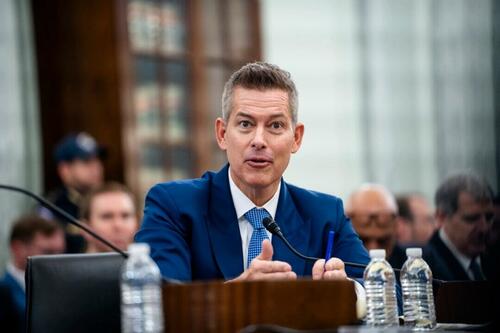DoT Makes DEI Revisions In EV Charging Infrastructure Funding Rules
Transportation Secretary Sean Duffy unveiled revised guidance for an electric vehicle (EV) charging infrastructure federal funding program, removing several diversity, equity, and inclusion (DEI) requirements, the Department of Transportation (DOT) said in an Aug. 11 statement.
The National Electric Vehicle Infrastructure (NEVI) Formula Program had allocated $5 billion to states for developing an interconnected network of fast chargers across the United States.
NEVI was part of the 2021 Infrastructure Investment and Jobs Act (IIJA), with the program a key aspect of the Biden administration’s push to make America reach net-zero emissions by 2050.
The program mandates that states submit plans detailing how they intend to use the federal funds.
The Interim Final Guidance issued by Duffy on Monday, and effective immediately, rescinds many DEI policies included in the program.
For instance, a requirement that state plans ensure the deployment and operation of EV charging infrastructure achieve equitable and fair distribution of benefits and services has been removed, DOT said.
Another requirement, according to which projects under NEVI target at least 40 percent of the benefits toward disadvantaged communities, has been rescinded, it added.
States were earlier asked to ensure that NEVI implementation creates opportunities for minority-owned and women-owned small businesses. This has now been revoked.
As Naveen Athrappully details below for The Epoch Times, the update “eliminates requirements for states to address consumer protections, emergency evacuation plans, environmental siting, resilience, and terrain considerations,” said the DOT.
It minimizes the need for states to consider electric grid integration and renewable energy in their plans, simplifies the approval process, and accelerates project deliveries.
The revised guidance for NEVI will ensure that “charging stations are actually built, and federal funding is spent effectively and efficiently,” DOT said.
According to a July 22 report from the Government Accountability Office (GAO), the IIJA had set aside $7.5 billion for NEVI and the Charging and Fueling Infrastructure Discretionary Grant Program (CFI) combined, to support development of public EV charging infrastructure.
However, as of April 2025, only 384 charging ports had been built nationwide under these initiatives, the report stated.
In its Aug. 11 statement, DOT said that the NEVI program was “established to fund States’ deployment of EV charging infrastructure, but Biden and [Pete] Buttigieg added requirements that were difficult to understand and implement.” Buttigieg was the secretary of transportation under the Biden administration.
“The Biden-Buttigieg Administration wasted time, money, and public trust in implementing the program,” the DOT statement said.
“The updates streamline applications, provide states with more flexibility, and slash red tape.”
DOT said the new guidance was in line with President Donald Trump’s Jan 30 executive order titled “Unleashing American Energy.”
In the order, Trump criticized “burdensome and ideologically motivated regulations” in recent years that have impeded the development of America’s abundant energy and natural resources.
The Transportation Department said the NEVI program is being aligned with “the Trump Administration’s priorities of safety, efficiency, and innovation,” the statement said.
Legality of Funding Cancelation
DOT’s revised guidance for NEVI funding follows the department’s suspension of funds for the program in February, which had faced criticism and legal challenges.
In a Feb. 6 letter sent to state departments of transportation, the Federal Highway Administration (FHWA)—an agency under DOT—informed them that it was suspending the commitment of NEVI funds.
A May 22 GAO report criticized the decision, arguing that DOT violated regulations in canceling the funding.
“DOT is not authorized to withhold these funds from expenditure, and DOT must continue to carry out the statutory requirements of the program,” the report said.
In May, a coalition of 16 states and the District of Columbia sued the Trump administration over its suspension of NEVI funding.
The lawsuit accused the termination of violating several regulations, including the Administrative Procedure Act and the Separation of Powers Doctrine.
In a June 24 ruling, District Judge Tana Lin of the U.S. District Court for the Western District of Washington granted a preliminary injunction barring DOT from withholding funding.
Lin ruled that DOT “attempted to override the express will of Congress” and overstepped its constitutional authority by withholding funding that was already approved by Congress.
Under the preliminary injunction, DOT was asked to release NEVI funds to 14 states.
In its Aug. 11 statement, DOT said that when Duffy and FHWA launched a review of NEVI earlier this year, 84 percent of the program’s funds were still unobligated, which it said was a “clear signal” of the initiative’s failure.
“If Congress is requiring the federal government to support charging stations, let’s cut the waste and do it right,” Duffy said.
“The Biden-Buttigieg Administration failed to deliver EV chargers despite their promises. Our revised NEVI guidance slashes red tape and makes it easier for states to efficiently build out this infrastructure. While I don’t agree with subsidizing green energy, we will respect Congress’s will and make sure this program uses federal resources efficiently.”
Tyler Durden
Tue, 08/12/2025 – 14:00ZeroHedge News





 R1
R1
 T1
T1


